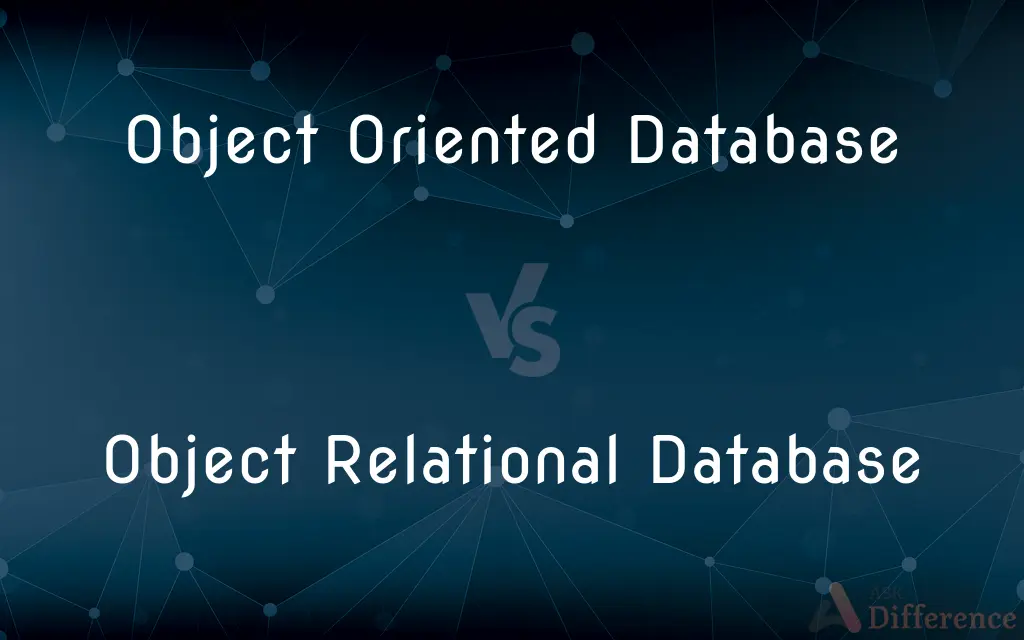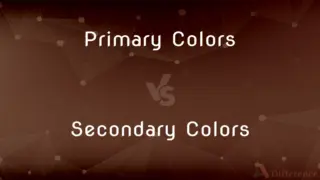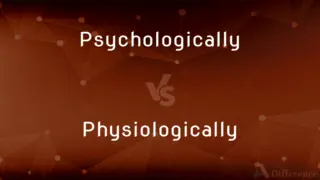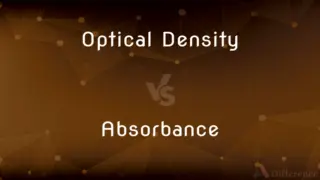Object Oriented Database vs. Object Relational Database — What's the Difference?
Edited by Tayyaba Rehman — By Fiza Rafique — Published on December 29, 2023
Object Oriented Databases (OODB) store complex objects; Object Relational Databases (ORDB) merge relational model with object-oriented features. Both manage data differently.

Difference Between Object Oriented Database and Object Relational Database
Table of Contents
ADVERTISEMENT
Key Differences
An Object Oriented Database (OODB) is a database system that incorporates the object-oriented data model. Such databases allow data to be stored as objects, much like in object-oriented programming. In contrast, an Object Relational Database (ORDB) is a blend of both the object-oriented and the relational database models. It utilizes the foundational structures of relational databases but integrates object-oriented features for enhanced versatility.
The primary distinction between an Object Oriented Database and an Object Relational Database rests in their foundational structures. The OODB exclusively follows the object-oriented paradigm, meaning that data is stored in objects, which can be instances of classes and can incorporate methods and behaviors. On the other hand, ORDB operates primarily on the relational model but introduces object-oriented elements, enabling the storage of complex data types and offering object capabilities.
The Object Oriented Database system's advantage is its seamless alignment with object-oriented programming languages, ensuring consistency between the application and the stored data. However, the Object Relational Database provides a broader approach, catering to applications that require the relational model's efficiency and the object-oriented model's complexity-handling capabilities.
When considering legacy systems and widespread usage, Object Relational Databases often hold the advantage due to their compatibility with existing relational databases. In essence, they allow an extension of relational systems with object-oriented features. Conversely, Object Oriented Databases, while powerful for certain applications, may not be as prevalent due to their specific design and approach.
Regardless of their differences, both Object Oriented Databases and Object Relational Databases seek to provide robust data management solutions. The choice between them often boils down to the application's specific requirements, existing systems, and the desired data management strategy.
ADVERTISEMENT
Comparison Chart
Foundation
Purely object-oriented model
Blend of relational and object-oriented models
Data Storage
Stored as objects
Tables with object-oriented features
Integration
Aligns with object-oriented languages
Extends relational databases with OO features
Application Fit
Specific applications
Wider range of applications
Prevalence
Less widespread
Commonly used due to relational model roots
Compare with Definitions
Object Oriented Database
OODBs bypass the need for object-relational mapping.
Object Oriented Databases eliminate the translation layer between object code and stored data.
Object Relational Database
ORDBs extend relational databases with object-oriented features.
An Object Relational Database can have tables storing multimedia data using OO capabilities.
Object Oriented Database
Object Oriented Databases encapsulate data and behavior.
Methods associated with data can be stored directly in the Object Oriented Database.
Object Relational Database
Object Relational Databases offer flexibility in data representation.
ORDBs can represent real-world entities both as tables and as objects.
Object Oriented Database
Object Oriented Databases offer persistent storage for objects.
OODBs can store complex, real-world entities with their behaviors.
Object Relational Database
ORDBs maintain the relational model's querying efficiency.
Object Relational Databases benefit from the mature SQL querying capabilities.
Object Oriented Database
An Object Oriented Database organizes data as objects.
OODBs align closely with object-oriented programming constructs.
Object Relational Database
Object Relational Databases can evolve from existing relational systems.
Legacy relational systems can be upgraded to ORDBs to incorporate object-oriented features.
Object Oriented Database
Object Oriented Databases support inheritance and polymorphism.
Hierarchies and relationships between objects are inherently managed in an OODB.
Object Relational Database
Object Relational Databases blend relational and object models.
ORDBs can store traditional table data alongside complex objects.
Common Curiosities
How does an Object Relational Database differ?
An Object Relational Database combines the relational model with object-oriented features, offering a blend of both systems.
Is an Object Oriented Database based on tables?
No, Object Oriented Databases focus on storing data as objects rather than in traditional tables.
Which is more prevalent: Object Oriented Database or Object Relational Database?
Object Relational Databases are more widespread due to their compatibility with existing relational systems.
Can I use SQL with Object Relational Databases?
Yes, ORDBs maintain the SQL querying capabilities of relational databases.
What is an Object Oriented Database?
An Object Oriented Database organizes and stores data as objects, aligning with object-oriented programming models.
Do OODBs support relationships like inheritance?
Yes, Object Oriented Databases inherently support object-oriented concepts like inheritance and polymorphism.
Is transitioning from a relational model to an OODB easy?
Transitioning may require redesigning and rethinking data models due to the foundational differences between them.
Why might someone choose an Object Relational Database over a pure relational model?
For the flexibility to handle both traditional table data and complex object-oriented data.
Are Object Oriented Databases more efficient than ORDBs?
It depends on the application; OODBs align better with OO programming, but ORDBs offer relational efficiency.
Do I need to learn new query languages for OODBs?
Some OODBs introduce new query constructs, while others may integrate with existing languages.
What are the key benefits of Object Relational Databases?
ORDBs offer the querying efficiency of relational models while accommodating complex, object-oriented data.
Can Object Relational Databases handle complex data types?
Yes, ORDBs incorporate object-oriented features to manage complex data alongside relational data.
Are ORDBs a newer concept than OODBs?
No, both concepts emerged around the same time, but ORDBs became more prevalent due to their hybrid approach.
Which database type should I choose for my application?
The choice depends on your data's nature, existing systems, application design, and specific data management needs.
How do Object Oriented Databases manage relationships?
Through object-oriented principles like association, inheritance, and aggregation.
Share Your Discovery

Previous Comparison
Primary Colors vs. Secondary Colors
Next Comparison
Humanities vs. Social SciencesAuthor Spotlight
Written by
Fiza RafiqueFiza Rafique is a skilled content writer at AskDifference.com, where she meticulously refines and enhances written pieces. Drawing from her vast editorial expertise, Fiza ensures clarity, accuracy, and precision in every article. Passionate about language, she continually seeks to elevate the quality of content for readers worldwide.
Edited by
Tayyaba RehmanTayyaba Rehman is a distinguished writer, currently serving as a primary contributor to askdifference.com. As a researcher in semantics and etymology, Tayyaba's passion for the complexity of languages and their distinctions has found a perfect home on the platform. Tayyaba delves into the intricacies of language, distinguishing between commonly confused words and phrases, thereby providing clarity for readers worldwide.















































